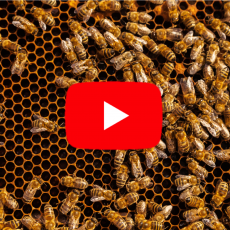COVID cannot stop love! But now, more than ever, keeping it small, keeping it local, and keeping it sustainable are the very best ways to show your love for each other and our Earth. So, let’s take a walk down the aisle and say, “I do” to sustainability.
Read moreYouTube Channel
Plastic Pollution Solutions

Today, we’re talking plastic. Some facts: If you didn’t know, plastic is made from petroleum. About 8.3 billion tonnes of plastic has been produced since the 1950s, which is roughly the weight of a billion elephants or 47 million blue whales. And only about 9% of that plastic has ever been recycled, 12% has been burned and the remaining 79% has ended up in landfills or the environment.
Plastic pollution is the most widespread problem affecting our marine environments. It threatens ocean health, food safety and quality, human health, coastal tourism, and contributes to climate change.
Read moreSustainability and Restoration

Hey, swrmers! Welcome back to the Hive! In our recent video on Sustainable Seafood, we talked about aquaculture projects having the potential to rebuild marine ecosystems and promote biodiversity. One such project taking place in New York Harbor is Billion Oyster Project, whose ambitious goal is to restore one billion live oysters to New York Harbor by 2035. We recently spoke with Danielle Bissett, the Assistant Director of Restoration at Billion Oyster, to learn more.
Read moreThe Carbon Footprint of Whisky

Thanks to all of you who have downloaded our App and sent through support and feedback! It really makes us proud. Today, we’re peeking behind the curtain to explore how we bring you the carbon footprint of products in our App.
Read moreEthical Shopping

We recently had the pleasure of chatting with Lindsay Karlsen, founder of VALYOS, an eco-friendly online platform for ethical shopping. The amount of research required to find sustainable products and brands is not always possible with life’s busy schedule. This is where VALYOS can help you connect with sustainable brands and second-hand sellers who share your same sustainability values.
Read moreswrm Fairy Tales of Sustainability

Today, from the Hive, we bring you classic tales of intrigue, suspense, and true love of sustainability! Once upon a time, in a magical land…
Read moreCompost and the City

Hey swrmers! Welcome back to the Hive. A few weeks ago, we spoke with William Klimpert, Common Ground Compost’s resident data and waste management expert about composting in New York City. But there’ve been some huge changes in the world since then. So, today, we’re here with Meredith Danberg-Ficarelli, the Director of Common Ground Compost, to talk about those changes and what the future of composting looks like in the Big Apple.
Read moreSustainability and Justice

In 2015, the Sustainable Development, or Global Goals, were adopted by the 193 United Nations member states with the landmark 2030 Agenda. These goals are a universal call to action by all countries – rich, poor, and middle-income – to end poverty, protect the planet, and ensure that every human being enjoys peace and prosperity by 2030.
The 2030 Agenda and the SDGs are ultimately about what makes us human, and are a roadmap to building a sustainable future in the world with care and compassion for each other, and care and compassion for the Earth.
Read moreSustainable Seafood

Global seafood consumption has more than doubled in the last 50 years, with demand reaching a staggering 143 million metric tonnes. And with an anticipated 10 billion people expected to inhabit the planet by 2050, the demand for animal protein will increase by 52 percent, making sustainable and healthy approaches to feeding the world more critical than ever before.
So today, we’re going to talk more about one of the most nutritious and sustainable proteins available on the planet — if sourced responsibly.
Read moreMethane and Global Warming

When we discuss climate change, most of our focus is on carbon dioxide or CO2 emissions. But today, we’re talking about methane, a greenhouse gas 80 times more potent than carbon dioxide. So, why don’t we hear more about it?
Read more